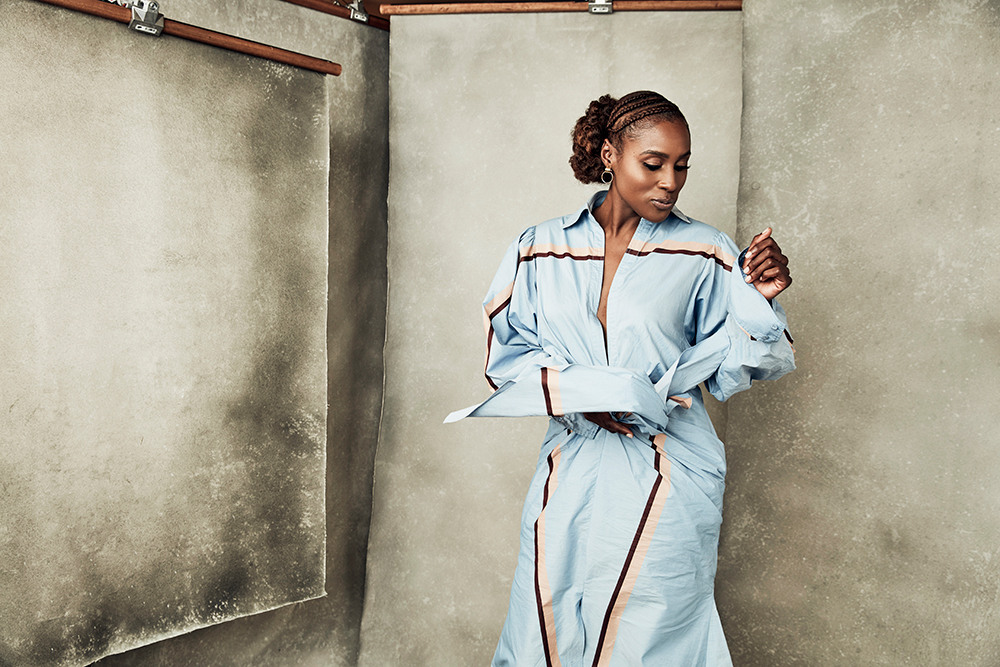Issa Rae Talks About Her White Audience, Shonda Rhimes and Male Nudity
By Henry Chu
LOS ANGELES (Variety.com) – Upheaval in the entertainment business may have sent traditional players scrambling, but it’s what has enabled Issa Rae to put out the stories she wants to tell and that had long been overlooked, the star of HBO’s “Insecure” said Wednesday.
In times gone by, there was “a constant desire to appeal to a broad audience that I don’t necessarily feel today, and I think that’s the shift,” Rae told a rapt audience at Mipcom in Cannes, where she is being honored as Personality of the Year. “Where television in the ‘90s and early 2000s [was] geared to capture the biggest audiences possible, which meant not addressing certain things or being tame with certain storylines, I think with the advent of cable and streaming, the desire to be ridiculously broad…isn’t really important. It’s really about authenticity.”
That change, Rae said, has allowed her and other African-American performers to be “unapologetic in our blackness…There’s a telling of the truth that there just hasn’t been in the past.”
But her meteoric rise from the online star of “Awkward Black Girl” to Emmy nominee for “” isn’t due simply to an ardent black fan base. As TV critic Iris Brey, who conducted the onstage Q&A with Rae, noted, 62% of “Insecure’s” viewers are white.
“That threw me all the way the f— off,” Rae said, to laughter from her listeners. “Which is great. It makes me want to go back in time and find that person [who said], ‘No one’s interested in watching these’” shows about people of color.
“Even white people are tired of seeing white-people shows,” Rae added to even more laughs, “turning on the TV and going, ‘Aargh, I know this story already.’ It’s overdue.”
The show’s snappy writing emanates from a writers’ room whose makeup matches what’s seen on screen. Most of the writers are women and most are black, representing a range of ages and sexualities. There’s one white male. (“Now you know how it feels,” Rae said the others like to rib him.)
“It’s been an amazing process. We argue a lot,” she said of the show’s writers. “We don’t want to tell the stories of people who aren’t in the room. If we’re telling a queer storyline, or this story about judging someone for having this kind of experience, [it’s important] that we have voices in the room who can speak to that as well, who can add to the argument.”
Although she appears on a more traditional platform now, on , Rae remains mindful of her digital roots and the power of the online community. Seeing the success of Shonda Rhimes’ “Scandal” – its groundbreaking status as a buzzy show with a black female lead that made savvy use of social media to build a loyal, active following – was a salutary experience. Never mind that Rae’s own stint at Shondaland was an unsuccessful one, with ABC passing on her show, “I Hate L.A. Dudes.”
“She paved the way for so many of us,” Rae said of Rhimes. “Scandal,” starring Kerry Washington, “legitimized the online audience and the online voice in a completely different way. And so, yes, I definitely look to her for inspiration for just starting a movement.”
In “Insecure,” the characters search not just for inspiration but also for love and sex. For Rae, it’s been important to show “dark people having sex and being desirable” in the honest and human ways that have been taken for granted on series with white characters. And as a heterosexual woman, working with mostly female writers, that’s meant plenty of male nudity on “Insecure.”
“We’re telling the show through the female lens, the female gaze, which is pretty rare,” Rae said. “There’s this male gaze we’ve always been subjected to, and this is an opportunity to reverse that.”
Rae gets some pushback for that frankness, and from a surprising quarter: her own mother, who watched an episode about a threesome gone wrong and told Rae: “You’re basically making porn.” Rae’s reply: “Mom, if you don’t like this episode, you should definitely not watch two episodes from now” – which was even more, shall we say, in your face.
But “Insecure” has allowed Rae to make a deeper exploration of the definitions of both masculinity and femininity. For a long time, she said, though happy to see black girls and women onscreen, she never thought herself as pretty as the character Laura Winslow on “Family Matters” or sisters Vanessa and Rudy on “The Cosby Show.”
Now she gets to challenge set notions of femininity, and to be able to broadcast that “is such a blessing,” Rae said.

